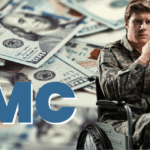If you’ve recently been diagnosed with a TBI and are receiving benefits, you should consider if you’re earning what you should be!
Are you earning 4k in benefits a month when you could be earning 10k?
The secret to this dramatic increase in compensation is a Special Monthly Compensation (SMC) benefit not everyone knows about.
SMC-T is a specialized VA disability benefit designed for Veterans suffering from severe Traumatic Brain Injury (TBI).
Here’s what you need to know:
- Eligibility: If you have TBI and require help with daily activities like dressing, feeding, or bathing, you may qualify for SMC-T.
- Payment Structure: SMC-T payments are made instead of regular monthly VA disability benefits.
- Rate Comparison: SMC-T is paid at the same rate as SMC-r(2), aimed at Veterans needing care above regular Aid & Attendance benefits.
For detailed information on VA SMC Rates, check our comprehensive guide, updated for 2023.
Learn all about SMC Rates and Benefits by clicking here!
Additionally, you can learn more in-depth information in our comprehensive video guide below.
How to Qualify for SMC (T)
To be eligible for SMC-T:
- Care Requirements: The Veteran must need nursing home care, residential institutional care without in-home aid, or hospitalization for their TBI.
- Ineligibility for SMC (r2): The veteran should not qualify for SMC (r2) but must be receiving regular aid & attendance for TBI residuals.
Application Process
- Automatic Consideration: Ideally, Veterans with qualifying conditions for SMC-T should be automatically considered by the VA. However, this is not always the case.
- Potential Errors: Mistakes during the application process or misjudgments by VA officials due to unclear TBI residuals are possible.
Think You’re Owed Benefits and Were Denied? Remember, Your Time is as Important as Your Claim
Your moments are precious, don’t waste them on legal complexities of trying to fight an appeal.
Get your free case evaluation with us today.







